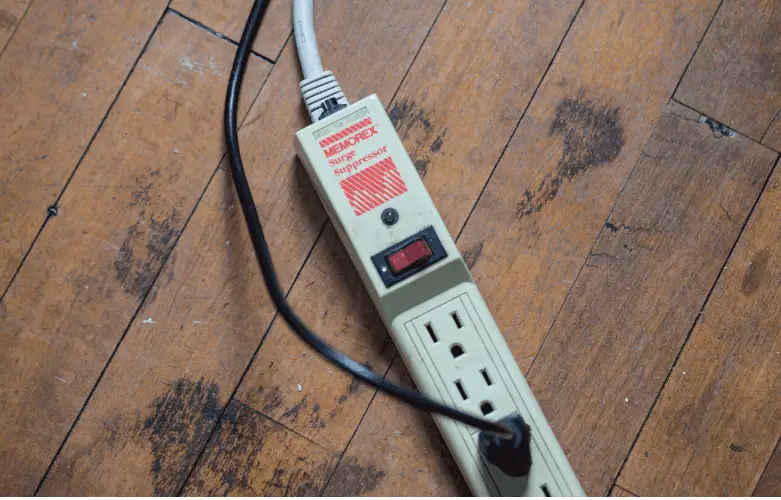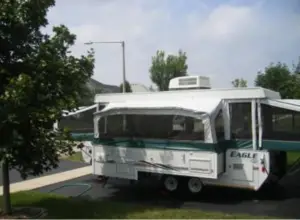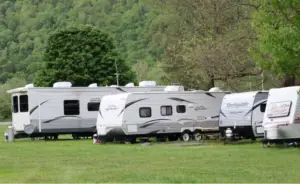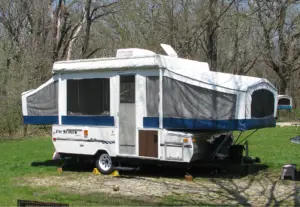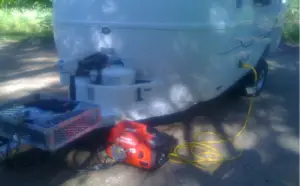As an RV owner, you have probably plugged your RV into many campground power pedestals of dubious reliability over the years.
You have likely found yourself wondering if the quality of the power coming out of some of those pedestals was a potential problem for your RV.
It’s best to be safe when you are running power through delicate and expensive electronics, and the best way to keep the devices in your RV safe is to use a surge protector on the power line.
If you’ve found yourself asking the question “Do I Need Surge Protector for RV?” then here are a few answers to the questions you may have about RV surge protectors.
What is an RV surge protector and how does it work?
An RV surge protector is a device that detects when the power supply fed into it is faulty. This can happen if the wiring for the power line is defective, or if the power is outside acceptable limits due to heavy load on the supply or events such as lightning strikes.
A surge protector generally contains a component such as a metal oxide varistor (MOV). This component absorbs power spikes that would otherwise find their way into the electronics in your RV.
A surge protector may also contain many other systems designed to detect issues and notify you of them before they become a problem. It will also include a breaker switch that will trip and cut the power if the quality variation has become too extreme.
Do you need a surge protector for your RV?
RV parks and campgrounds tend to have fairly unreliable power supplies. Often the people who own the park will be the ones doing repairs to the park’s simpler electrical wiring, and many of them have no clue what they are doing.
You can frequently find that the wires are connected the wrong way round, or that the ground wire is not connected or is defective.
Having a large number of RVs all connected to the same power line can also lead to many problems. At certain times of the day, many of the RV owners may choose to turn on their air conditioners or other power-hungry appliances at nearly the same time.
This can cause a massive fluctuation in the power supply. Some RVs may also have defective wiring which can affect the quality of the power you are drawing.
Natural events can cause severe power spikes. Lightning or static electricity from a thunderstorm may cause all manner of issues, particularly if there is a direct lightning strike on a power pole or transformer.
High winds blowing branches against the power line can also cause problems when the power arcs.
So yes, you should have a surge protector to protect your RV against power spikes and other issues. Think of all the expensive electronics in the appliances in your RV, and then think about the cost of repairing or replacing those appliances when a power spike inevitably happens. When compared to the cost of a surge protector you would be silly not to have one.
What are the different types of RV surge protectors?
There are two main types of surge protectors that you can get for your RV.The first type is a standard surge protector.
These can come with a wide range of features but they will all filter and cut the power when high or low power events occur. Most of the more expensive ones can also tell you if the polarity on the wiring is wrong, or if there is a missing ground connection.
The second type is an Electrical Management System (EMS). An EMS is a more elaborate device that provides a wider range of protection and can detect a large number of wiring issues.
Among other things, they can detect when the alternating current frequency is outside acceptable limits and when you have inadvertently connected your power cord to the wrong voltage outlet (eg. 220 volts instead of 110). These tend to be more expensive but can save you money if there is an issue that a standard surge protector can’t detect.
Both standard and EMS surge protectors can come as portable units that you attach to the power pedestal where you normally plug in the power cord for your RV. You can also get versions that are hard-wired directly into your RV’s electrical system.
This has the advantage that the device can’t be easily stolen and you won’t forget to attach or detach it from the power pedestal.
You can also get surge protectors designed to work with 30 amp or 50 amp RV electrical systems. These are discussed below.
Can an RV surge protector go bad over time
Yes, various factors can do incremental damage to a surge protector and result in it needing to be replaced or repaired. The main factor is variations in the power passing through the device.
While the surge protector is designed to stop those power variations from getting through to the RV, it is affected by those variations itself to some degree and will eventually become seriously damaged by them.
Severe spikes from lightning strikes and other events can cause more extreme damage that will cause the device to degrade faster, or even burn it out completely.
The device is also out in the weather while it is hanging on the power pedestal. While it is sealed against the outside environment to some degree it will still take damage over time.
Some surge protectors have warning lights that will tell you if the device needs replacing, but these can be unreliable. You can also try getting the device examined or tested at your local RV service center if they provide that service.
If you think your surge protector needs replacing then the best thing to do is to buy a new one though. Better that than to have your RV unprotected.
Should you get a 30 amp or 50 amp surge protector for your RV
You should get the correct type of surge protector for your RV. A 50 amp unit used with an electrical system rated at 30 amps may not trip the breakers in the event of a power spike. A 30 amp unit may not have sufficient protection for a 50 amp power draw.
Generally, RVs that use more power concurrently will use a 50 amp system. This can be the case if you have twin air conditioners servicing the front and back of the RV, for example.
Most RV’s that have lower concurrent power requirements will use a 30 amp power system. Check what the rating for your RV is and make sure that you use the correctly rated surge protector for it.
What are the 5 best RV surge protectors that you can buy
Surge protectors are constantly being improved and new ones are always finding their way onto the market so you should do some research to find the best protector for you. Here are some suggestions for some of the better protectors that are currently available in 2019 though.
- Progressive Industries 313.1168 SSP30X Surge Protector
- TRC Surge Guard 44260 Portable Surge Protector
- Progressive Industries SSP-30XL Surge Protector
- Camco Heavy-duty Dogbone RV Circuit Analyzer
- Progressive Industries SSP-50XL Surge Protector
How can you secure your RV surge protector against theft?
Surge protectors are expensive devices and RV parks and campgrounds can be home to some unscrupulous individuals. They are also generally open enough that anyone can walk in and get easy access to your RV.
While you probably lock your RV against theft, anything outside it that isn’t well-secured will be thief-bait. This includes your surge protector when it is attached to the power pedestal. If you don’t properly secure your surge protector it will eventually get stolen.
Fortunately, you have a few different ways to secure your surge protector. Most surge protectors and power pedestals are designed to allow you to secure the surge protector and pedestal together with a padlock.
You should find a loop on the pedestal where the padlock goes on. You can also run a chain or cable with a padlock around the surge protector and pedestal while looping it through any holes provided for securing the protector.
Chain or cable locks designed for securing bicycles can be used for this purpose. Some of these come with alarms that will trigger if the cable is cut. You may also find that the power pedestal has a cover that will flip over the surge protector and which can be secured with a padlock.
You can buy covers designed to go over the surge protector and pedestal if the pedestal doesn’t have one attached.
Nothing is ever completely thief-proof, but these methods should help prevent casual theft. If you really want to prevent the device from getting stolen then consider getting an electrical management system hardwired into the RV itself.
Conclusion
Your RV is an expensive machine with many pricey electronic components and appliances contained within it. All of those electronic devices are dependent on the quality of the power you put into the vehicle.
Buying a good surge protector is much like taking out an insurance policy for all of those electronic devices. If you’ve ever asked yourself the question “Do I Need Surge Protector for RV?” then the answer is probably yes.
Without a decent surge protector you are one bad power spike away from having an RV full of fried electronics, so consider getting one today.

